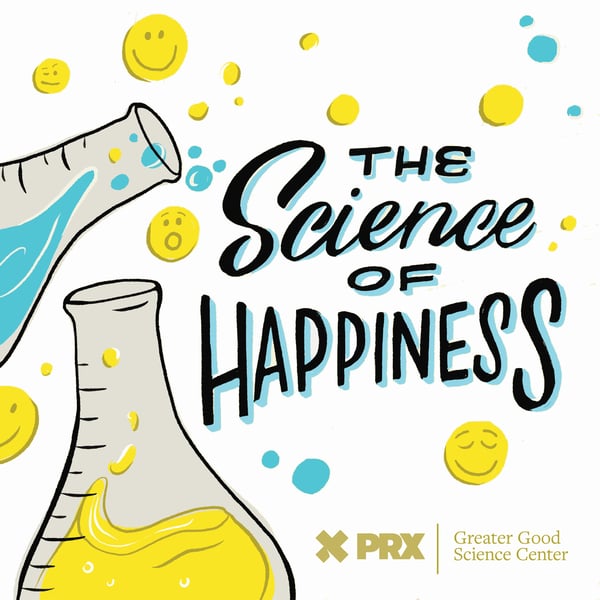Happiness Break: A Meditation To Move Through Anger, With Eve Ekman
The Science of Happiness
PRX and Greater Good Science Center
4.4 • 1.9K Ratings
🗓️ 4 April 2024
⏱️ 8 minutes
🧾️ Download transcript
Summary
Accepting difficult feelings like anger or irritation can help us keep our cool, feel better overall, and find calm on the other side.
Link to episode transcript: https://tinyurl.com/n6hm5yhz
How to Do This Practice:
Begin the practice by settling your mind and body. Notice your breath and any sensations that arise in your body,
Shift your attention away from your body, recalling an instance where you felt mildly irritated or frustrated. Give yourself a few moments to fully feel this emotion.
Notice any physical sensations that arise. Then, release that memory, refocusing your attention on the body.
Allow these sensations to shift and move, giving them the space to change and observing them with a sense of curiosity and kindness.
Consider shaking hands with the emotion the next time it arises in your daily life.
Today’s Happiness Break host:
Eve Ekman is a contemplative social scientist and meditation teacher from San Francisco, California.
Learn more about Eve’s work: https://tinyurl.com/2vhuarh8
Find out about Eve’s Emotional trainings with Cultivating Emotional Balance: https://tinyurl.com/5n95m7yx
Explore Eve’s Project, The Atlas of Emotions: https://tinyurl.com/mt75ytm3
Follow Eve on Facebook: https://tinyurl.com/3txahape
More resources from The Greater Good Science Center:
How to Regulate Your Emotions Without Suppressing Them: https://tinyurl.com/4x29denx
What to Do When You Feel Stuck in Negative Emotions: https://tinyurl.com/mwczxfya
How to Turn Your Brain from Anger to Compassion: https://tinyurl.com/57upkcfa
How to Overcome Destructive Anger: https://tinyurl.com/49zu6whw
We love hearing from you! How do you manage your emotions? Email us at [email protected] or use the hashtag #happinesspod.
Find us on Spotify: https://tinyurl.com/6s39rzus
Help us share Happiness Break! Rate us and copy and share this link: https://tinyurl.com/6s39rzus
We're living through a mental health crisis. Between the stress, anxiety, depression, loneliness, burnout — we all could use a break to feel better. That's where Happiness Break comes in. In each biweekly podcast episode, instructors guide you through research-backed practices and meditations that you can do in real-time. These relaxing and uplifting practices have been shown in a lab to help you cultivate calm, compassion, connection, mindfulness, and more — what the latest science says will directly support your well-being. All in less than ten minutes. A little break in your day.
Transcript
Click on a timestamp to play from that location
| 0:00.0 | The Science of happiness was proudly brought to you by the John Templeton Foundation, |
| 0:04.0 | funding research and catalyzing conversations that inspire people with awe and wonder. |
| 0:09.0 | Discover the latest findings in neuroscience, cosmology, and the origins of life at templeton.org. |
| 0:15.0 | I'm Dacker Keltner. |
| 0:20.0 | Welcome to Happiness Break where we take a few moments to try a practice to support our minds and hearts and help us feel happier through the rest of the day. |
| 0:28.0 | A lot of our happiness comes from gaining perspective on the hard things in life. So today we're zeroing in on anger. |
| 0:37.4 | We can't will ourselves to never feel angry, nor would we want to, but we can learn how to process anger in a healthy way by |
| 0:45.6 | accepting it mindfully. When we do this, studies show that we don't flare up as |
| 0:50.0 | much in the moment. We handle conflicts better, our moods, or more elevated and overall |
| 0:55.2 | we feel less stressed out in our daily lives. Today's practice is led by |
| 1:00.8 | contemplative social scientist Eve E. Ekman. |
| 1:03.8 | It starts with some guided deep breaths, |
| 1:06.2 | and then we'll call to mind something that's just a little bit frustrating |
| 1:09.7 | because it's often good to start small. And then we'll just observe what that feels like in the body, |
| 1:15.8 | what it's like to cultivate acceptance, and then hopefully leave you feeling more relaxed. |
| 1:21.8 | Here's Eve. |
| 1:40.0 | Let's begin by settling our body and mind, connecting with the breath and the body. To help us do so, let's pay attention to the breath. Inhale, noticing the sensations of breath and inviting a sense of vividness. |
| 1:49.0 | Exhale, relaxing, allowing yourself to feel ease. |
| 1:57.8 | Inhale, drawing in with that sense of vividness. |
| 2:07.0 | Exhale. vividness, exhale, relaxation, and ease. As we inhale, we might have a sense almost of elongating the spine, being more upright with that vividness. |
| 2:22.0 | And as we exhale, we could imagine softening and relaxing through the face and the chest and the belly. |
| 2:31.0 | And allow your attention and awareness to be throughout the body, noticing the sensations in the face and the chest and the belly once again. |
... |
Please login to see the full transcript.
Disclaimer: The podcast and artwork embedded on this page are from PRX and Greater Good Science Center, and are the property of its owner and not affiliated with or endorsed by Tapesearch.
Generated transcripts are the property of PRX and Greater Good Science Center and are distributed freely under the Fair Use doctrine. Transcripts generated by Tapesearch are not guaranteed to be accurate.
Copyright © Tapesearch 2025.

